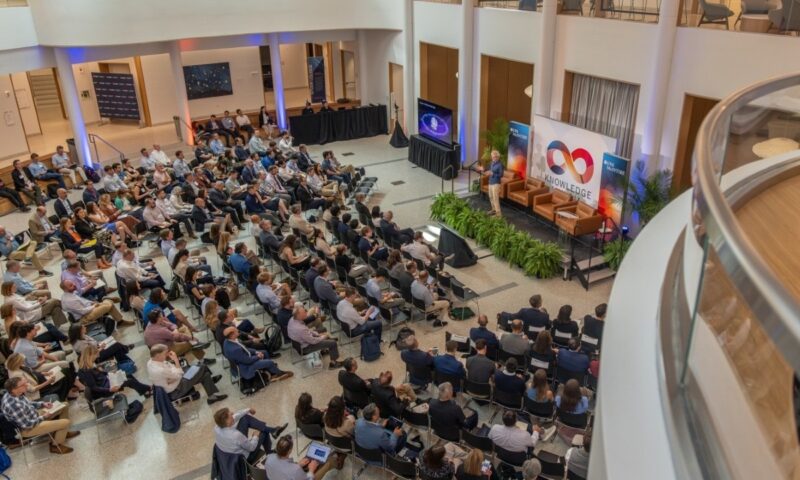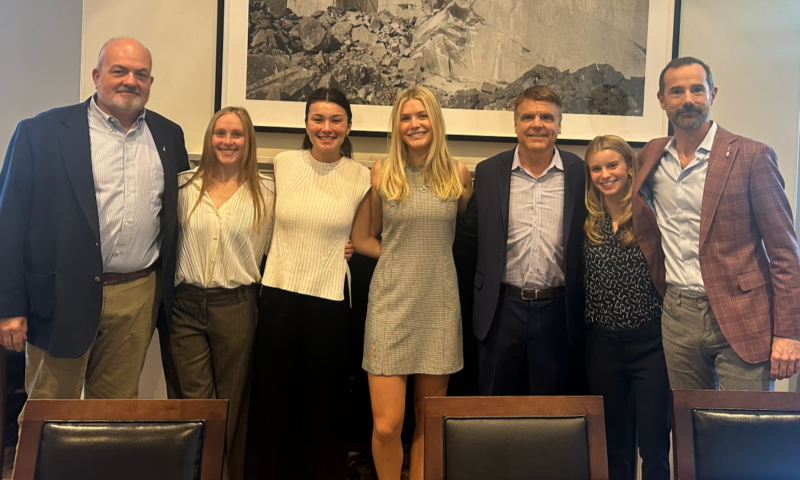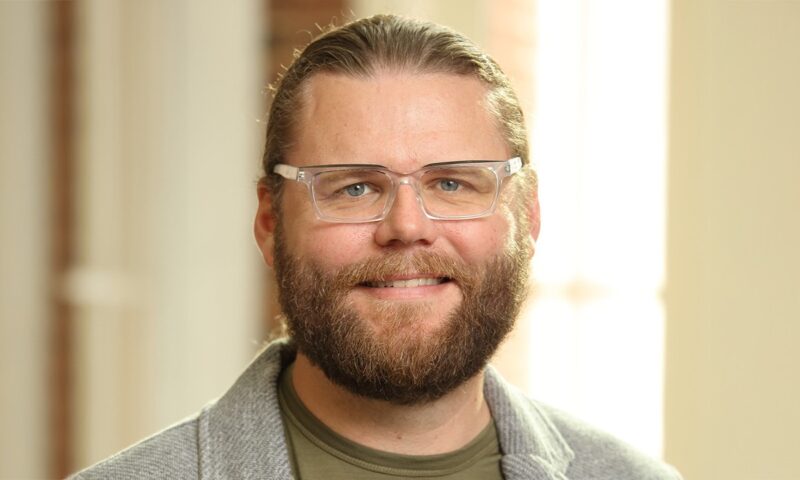If you’re listening to UVA student speeches detailing the benefits of drinking tea, stressing the importance of incorporating mindfulness into a daily routine, or toasting the members of the University’s national champion basketball program, the McIntire School of Commerce might not be the first school on Grounds you would expect to host such an event.
But life is full of surprises. In fact, the April 24 event was the 20th such edition of the annual or semiannual Communication Forum, which McIntire Management Communication Professor Rob Patterson incorporated into his elective class COMM 4641, “Public Speaking and Persuasion,” in 2007. Covering subject matter that ranges from mouthwash to Machu Picchu in the four-minute talks is standard operating procedure for the forum of student speechwriting, the last speeches the students deliver for the semester.
Despite the abundance of seemingly un-businesslike topics presented at the forum—Great Lakes shipwrecks, Brazilian churrasco dining, for example—the occasion offers each student the opportunity to retool and deliver a previously given commemorative, informative, or persuasive speech of Patterson’s choosing, which has a direct application to the larger business education they receive, while showcasing many of the skills employers are seeking.
Stylistic Variations
Patterson says that students often haven’t explored commemorative speech giving, “but it’s really aligned to leadership in that the speeches mostly celebrate, eulogize, or pay tribute in some sense.” In daily speaking in the workplace, he says, introductions and farewell or retirement speeches provide examples of when the students might find themselves in the commemorative lane.
And though informative speaking might seem straightforward, it’s harder than it looks: Delivering the facts, uncolored by opinion, is a speaking technique that takes focus and dedication. “A recent informal survey of companies revealed that employers find this tone wanting sometimes in early-career professionals,” he says.
Patterson believes that persuasive speeches, the third genre, are the students’ favorite, because convincing others is such an important skill and because “they see so much transferability to business and industry.”
Indeed, May graduates AJ Getter (McIntire ’19) and Taylor Godine (McIntire ’19) were both excited that Patterson had chosen persuasive speeches for them to deliver. “I enjoy critical thinking and debating, so the style comes most naturally to me,” Getter says.
Trading Spaces
This year’s forum—like those before it—was held in a location outside of the class’s usual Rouss & Robertson Halls location and open to the public. Patterson informed the students they would be giving their talks in Hotel C, also known as Jefferson Hall. The venerable West Range room has fittingly served as the student oratorical and debating club meeting area since the University opened.
“So many of the public speaking courses feature speeches being given only in the classroom,” Patterson explains. “The basic idea of the forum is for the students to export their learning to a different location so that they interact with an audience other than those enrolled in their course and that they use this end-of-semester experience in a space that’s different, perhaps more challenging to speak in.”
The change in environment also tests many of the concepts students discuss in the course, Patterson says. “For example, we talk about how different spaces require different adjustments to volume, movement, eye contact, and gestures.”
Ann McClain Bridges (McIntire ’19) says that different setting was only the first hurdle. The new location, open to the sounds of passing buses and passers-by calling out to each other, required some on-the-fly adjustments for the students.
“Hotel C had very different acoustics and a lot of background noise from outside that speakers had to account for. Everyone had to project their voice a little louder than normal,” she says.
Godine remarked that moving within the new space presented a challenge, as did engaging each section of the audience equally. Classmates were seated up front, with guests mostly seated throughout the back of the room.
Getter says that transplanting the class to a different location also created an additional issue beyond anyone’s control. “There’s a certain psychological effect it brings that was the most difficult to deal with—the opportunity for new, unknown people or sounds to enter and exit during my speech,” he notes. “Having a dynamic and uncertain audience was something we all had to address for ourselves mentally before delivering our respective speeches.”
An On-the-Job Asset
So was it worthwhile? The students think so. The exercise, and the semester’s worth of speechmaking, instilled a confidence in their public speaking proficiency as they ready themselves for their professional lives.
Bridges, a soon-to-be Analyst with Barclays in New York, says that Patterson’s course took her and her peers out of their comfort zone, prepared them to be comfortable addressing people without notes, and taught them to rely on their own knowledge. The experience is also something she believes will set her apart from others in the workforce: “Public speaking is one of those skills that many people have not mastered.”
Getter, who will be joining Bregal Partners in New York this summer, is appreciative of having a testing ground to hone his abilities.
“I loved the community that Professor Patterson created to help us all feel comfortable with each other, both for speaking and giving feedback. He effectively designed a safe space where we could be vulnerable and experiment in our speaking styles, while also receiving genuine advice from our peers,” he says.
Brandon Zhao (McIntire ’19), who will work for Wells Fargo Securities in Charlotte, NC, after graduation, says the class helped round out his abilities, developing his fluency in speaking without any aids. “In ICE, we got a lot of experience giving presentations, but I didn’t have as much experience speaking without a PowerPoint presentation or anything to lean on. This was a new type of public speaking experience, and because of that, I enjoyed it.”
Much like the four-minute versions of previously given speeches given during the Communication Forum, Patterson believes that the presentations students can expect to be called to deliver after McIntire will likely also be reiterations for a series of audiences with various interests in changing locations.
“When I worked in Puerto Rico, I attempted to sell the services of my agency to potential clients. I gave the same message several times during a two-week span,” he says. “I believe there’s a lot of that type of presentation regime that our students will face once they leave us.”
A Special Edition
Patterson says this year’s COMM 4641 group started the semester looking to build skills in different areas, and the resulting forum “takes on a different vibe each year.” Some students faced major personal challenges outside the classroom—and those impacted both their comfort with and their execution of speaking. Factors such as communication apprehension and physical issues that made speaking challenging elevated the 20th Communication Forum’s importance to Patterson, with good reason.
“These students self-selected to join the course, and that’s revealing,” he says. “In my book, that choice to come into the course equates to academic and personal development bravery, and so—for me personally—the forum this year was an oral and kinetic manifestation of this bravery. This class was filled with courageous individuals, and the forum was one more opportunity to see it on display.”



